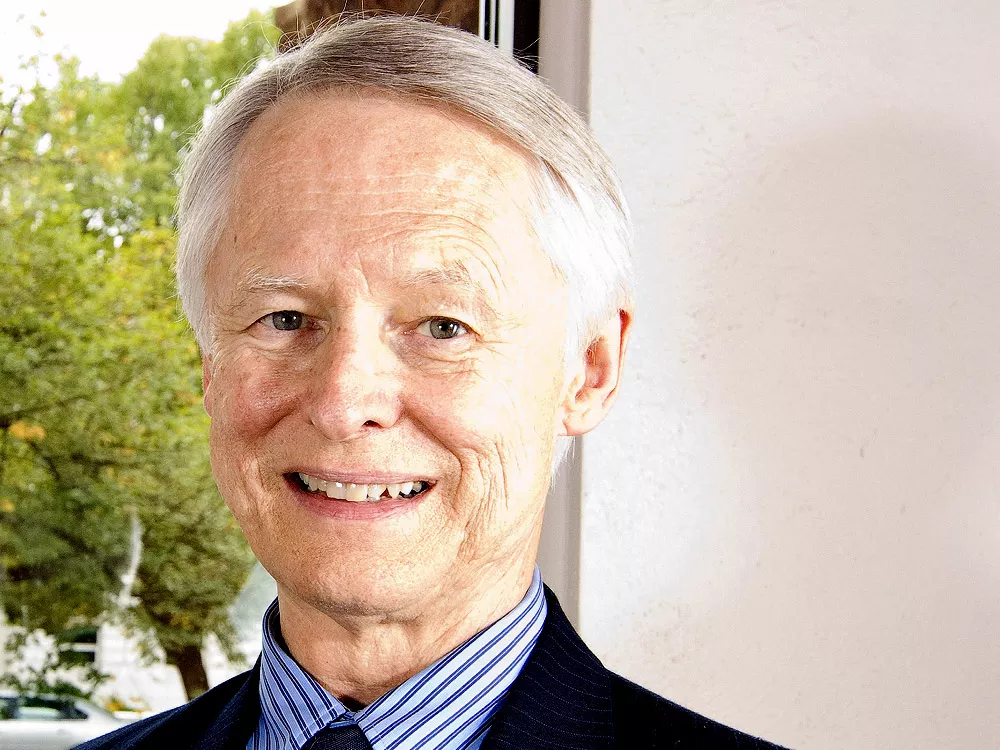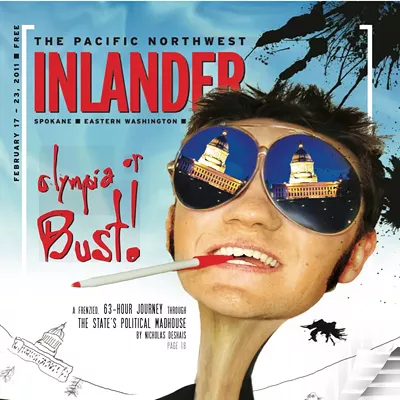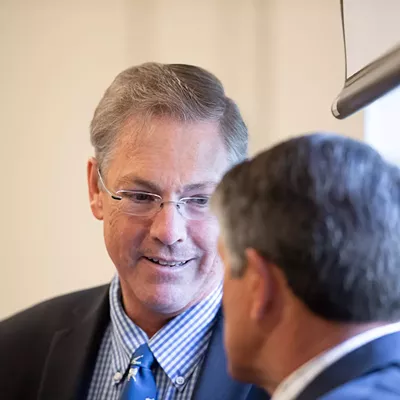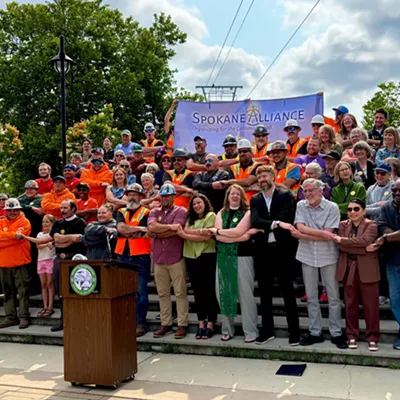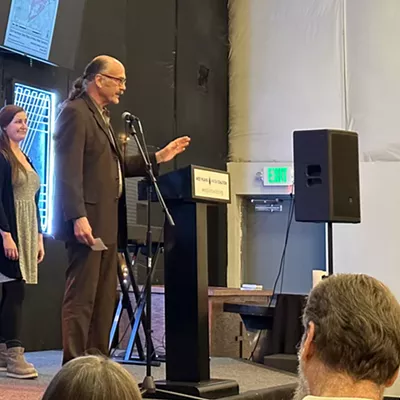Sam Reed is in his wheelhouse. A month after the primary election and less than two months from a hotly anticipated general election, Washington’s Republican Secretary of State — whose duties include regulating the state’s archives and the state seal, but mostly overseeing elections — hit the road this week to get out the vote. The Lewis and Clark High and WSU alum stopped by The Inlander to talk shop on Friday.
INLANDER: This should be one hell of an election. For starters, there are nine measures on the ballot. How are voters going to deal with this?
REED: They’re going to have to rise to the challenge. These are gonna require some deliberation. We have contradictory measures, to a degree, in the liquor ones [Initiatives 1100 and 1105]. ... You have one that would increase revenues, with the income tax [I-1098], and one that would decrease revenues by removing those taxes [I-1107] — and then [one that would] make it difficult to increase taxes, with the [Tim] Eyman initiative [I-1053]. That’s going to make for a very interesting year.
What are you doing to educate voters?
It’s a fine line for us. Unlike you, we can’t in any way be taking sides. Our job is to lay it out there. We really have made tremendous progress on voter information. If you go to our website — vote.wa.gov — and click on My Vote, and put in your name and your birth date, up will come all the races that you personally are eligible to vote on and links to the candidates.
You wrote a foreword for a new book (see below), An Election for the Ages, about the controversial 2004 race between Gov. Christine Gregoire and (now-Senate candidate) Dino Rossi. What reverberations from that election are still felt?
[That election] did uncover a lot of shortcomings. You may recall the judge found out there were 1,741 illegal ballots. Most were felons. There were 19 who voted who were deceased. I was shocked. I had no idea. I’d been in the elections business in this state for years.
The spotlight was relentless and there were reforms needed and the Legislature and our office and the governor collaboratively worked together on, I believe it was, over a thousand law or rule changes. By combining all 39 county databases into one and being able to get access to the best databases in the country — the Social Security death index and the Department of Corrections index — we’ve been able to really clean it up a lot more.
Moving the primary [to August] was also a piece of that. We ended up with 19 days between the time primary ballots were certified and the ballots had to be in the mail. In that 19 days, we’re supposed to do military and overseas voting, and it’s physically impossible.
You came under fire in the last month for seeking a waiver from a federal program that required states give overseas military members 45 days to vote.
The United States Congress actually talked to us because we have one of the best [military voting] records in the country. Of the military that votes, we’ve been able to count 99 percent of their ballots. Most of the states, it’s more like two-thirds. We’ll e-mail them their ballots. We’ll fax ballots. [We end up giving them] 51 days.
[Congress was] going to include language to [require] that [paper] ballots have to be mailed out 45 days before the general election [because] most congressmen — in their states — ballots have to be in by election day. We explained that, ‘Wait a minute, we have a late primary. It’d be hard to get those ballots mailed out 45 days before.’ So we asked for a waiver. Right away, they granted it to us.
That’s not how Fox News described it…
Well, Fox News … a reporter got on there and said the state of Washington isn’t doing 45 days. One of the ironies of the whole thing is that it’s [supposedly] a Democratic Party plot, which I’m a key part of. Yeah, right.
It was clear that [the reporter] just didn’t get it.
And so she repeated this a few times — that we’re just purposefully making it hard for military people to vote. The next day, at the Republican state committee meeting, one of the firebrand hardcore conservative types [moves] to censure the Secretary of State. And the darn thing passes. Of course they didn’t talk to me.
People would call up, angry, and we’d explain.
‘Ohhhh …’ [they’d say]. Sort of like the old Saturday Night Live thing: ‘Nevermind.’
The courts have now affirmed that you can release the names of people who sign ballot-measure petitions (like last year’s R-71). What do you think of this?
My position and [Attorney General] Rob McKenna’s is that this is a very public act — to propose legislation or to propose undoing legislation. This is not a private matter. Plus, they do it in very public circumstances. They do it out in grocery stores and ferry docks. And they’re posted and hung and put on counters and you can go up and read who’s done them. They tried to make it like it’s a secret ballot. And heavens, no, it’s not a secret ballot.
But it went all the way to the U.S. Supreme Court and … by a margin of 8-1, [they] ruled in our favor that they are public records.
So, how will these be made public?
Somebody does a public record request. And by the way, the reason it was never an issue in the past is that we would have people come in — in the ’70s, ’80s, ’90s — and we’d say, ‘Well, there they are.’ And they’d look, and there’s a roomful, just stacked up there, of all these names and addresses that are totally out of order. And they’d [say], ‘Oh well, nevermind.’ In this decade, with technology being what it is, the first thing we do, for security purposes, is scan them in and store them on a disk. So all of a sudden, we have these hundreds of thousands of signatures. And I understand there’s software now that can go in there and sort.
So we started having requests in 2006 — and granting them — and it’s because we had a request this time that precipitated that lawsuit. Now, [initiative hawker Tim] Eyman doesn’t like it because, of course, he likes to have the names for himself.
I hope that by this being more public and people realizing somebody’s gonna request [their signatures], when they sign it, a little more of a sense of responsibility … Do I really want to be associated with this issue?
What’s your relationship like with Tim Eyman?
The guy’s filed so many
initiatives he practically lives in your office. Do you two go out for
beers? No. Because we enforce rules, because we take stands, he tends to
be very unhappy with me. In fact, when he comes in with his petitions, I
always make sure I’m not there.
Sam Reed will talk about the Top Two Primary and the 2004 election at the "Pizza, Pop & Politics event at WSU's Honors Lounge at 11 am on Wednesday, Sept. 22, in Pullman. Lunch will be served at noon and the author of An Election for the Ages (former Spokane TV reporter Trova Heffernan) will make remarks and sign books with Reed.

